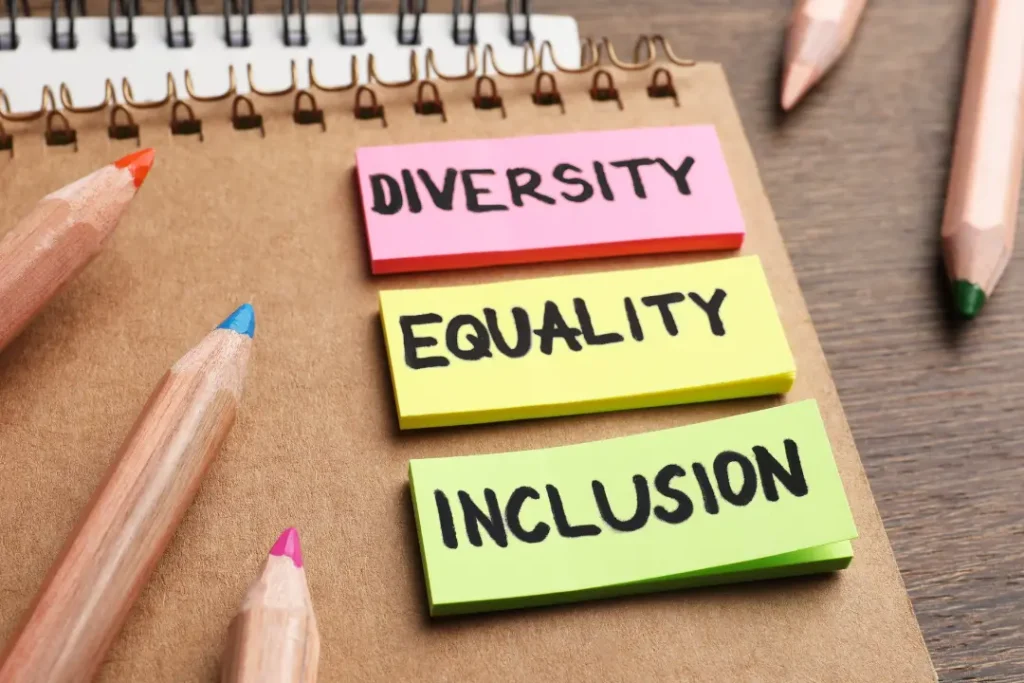In the constantly evolving business world, it has become increasingly evident that diversity and inclusion are integral elements for success. This holds true for franchising, where a diverse range of individuals and ideas can lead to new avenues of growth and development. In this blog post, we will delve deeper into the importance of diversity and inclusion in franchising, how to overcome barriers to their implementation, strategies for promoting them, and the future outlook of franchising with diversity and inclusion at the helm.
Understanding Diversity and Inclusion In Franchising
Diversity and inclusion in the franchising world embody the principles of creating an environment that respects, welcomes, and recognises the value of all individuals, irrespective of their racial, ethnic, gender, age, or socio-economic backgrounds. It goes beyond simply ticking boxes or meeting quotas; it’s about ensuring everyone has a seat at the table, and their voices are genuinely heard and valued.
At the core, diversity in franchising means that a franchise has a wide array of franchisees from different backgrounds, cultures, genders, ages, and experiences. It encourages a rich melting pot of ideas, perspectives, and approaches to business, which can ignite creativity, innovation, and progressive thinking within the franchising network.
On the other hand, inclusion is about creating a franchising environment that values and leverages these diverse perspectives and fosters a sense of belonging among all franchisees. It’s about ensuring that franchisees feel valued, respected, and integral to the franchise’s success regardless of background.
An inclusive franchise doesn’t just allow diverse franchisees to exist within the system; it intentionally involves them in decision-making processes, seeks their input, and actively supports their growth and success. This creates a collaborative culture where all franchisees feel a sense of ownership and commitment to the franchise, contributing significantly to its overall success.
However, embracing diversity and inclusion in franchising isn’t always straightforward. There can be tangible and intangible obstacles that hinder their implementation. Some franchisors might grapple with unconscious biases, while others could struggle with structural barriers that inadvertently exclude certain groups.
The following section will explore these challenges in greater depth and discuss strategies to overcome them.
Overcoming Barriers to Diversity and Inclusion
Creating a diverse and inclusive franchising environment is not always plain sailing. There can be several impediments that might prevent franchisors from fostering diversity and inclusion. Acknowledging and addressing these barriers is the key to successfully implementing diversity and inclusion.
One of the most prevalent obstacles to diversity and inclusion in franchising is unconscious bias. These are the inherent or learned stereotypes that people unknowingly attribute to others that affect their understanding, actions, and decisions. Unconscious bias can create an unwelcoming environment for franchisees from diverse backgrounds and may lead to discriminatory practices in recruitment and decision-making processes.
Combating unconscious bias requires constant effort and vigilance. Franchisors should consider providing diversity and inclusion training to all staff members, particularly those involved in recruitment and selection processes. The training should help identify and address their biases and provide tools to make more objective decisions.
Another obstacle to diversity and inclusion in franchising is structural barriers. These barriers may exist in policies, procedures, or practices that inadvertently exclude or disadvantage certain groups. For instance, requirements regarding financial resources or prior business experience may unintentionally deter individuals from underrepresented backgrounds from owning franchises.
To dismantle these structural barriers, franchisors must critically review their current policies and practices. Are there specific requirements that may unfairly disadvantage some groups? If so, consider revising or eliminating them. Franchisors could also look into implementing support mechanisms, such as providing financial assistance or business training for individuals from underrepresented backgrounds.
Lack of representation can also be a barrier to diversity and inclusion. If potential franchisees do not see individuals who look like them or share similar experiences in leadership roles, they may feel like they do not belong in the franchise network. By promoting diverse franchisees to leadership positions, franchisors can ensure that different voices are heard and show that they genuinely value diversity and inclusion.
Finally, maintaining an inclusive culture is a crucial challenge to diversity and inclusion. Creating a culture where everyone feels valued, respected, and included is a continuous process that requires commitment from everyone within the franchise network. It involves actively seeking and respecting diverse perspectives, creating open communication channels, and fostering a sense of belonging among all franchisees.
Addressing these barriers may seem daunting, but it is vital for fostering diversity and inclusion in franchising. The following section will discuss how to promote diversity and inclusion actively within the franchising environment.
How To Promote Diversity and Inclusion
Promoting diversity and inclusion within a franchise requires a proactive and conscious effort. There are a variety of strategies that franchisors can adopt to foster an inclusive and diverse franchising environment.
Firstly, franchisors must ensure that diversity and inclusion are part of their core values and business strategy. This commitment should be explicitly communicated to all franchisees and employees. It sends a strong message that diversity and inclusion are not just buzzwords but are integral to the franchise’s culture and success.
Next, franchisors can utilise inclusive recruitment and selection processes. This means actively reaching out to a diverse range of potential franchisees, being transparent about selection criteria, and ensuring the recruitment process is free from bias. By doing so, franchisors can attract and recruit franchisees from various backgrounds and experiences.
Providing mentorship and development opportunities can also promote diversity and inclusion. By offering these opportunities, franchisors can help franchisees from underrepresented groups to grow and succeed in their franchising journey. This can increase franchisees’ diversity in leadership roles, inspiring potential franchisees from similar backgrounds to join the franchise network.
Another effective strategy is the creation of employee resource groups (ERGs) or networking groups. These groups provide a platform for franchisees from diverse backgrounds to connect, share experiences, and support each other. They can also be a valuable source of insight for franchisors, helping them understand the unique needs and challenges faced by different franchisees.
Franchisors should also implement regular diversity and inclusion training. As discussed earlier, unconscious bias can hinder diversity and inclusion efforts. Regular training can help franchisees and employees recognise their biases and learn how to overcome them. It can also give them the necessary skills and knowledge to foster an inclusive franchising environment.
Lastly, franchisors should regularly measure and evaluate their diversity and inclusion efforts.
This could involve conducting diversity audits, employee satisfaction surveys, or collecting feedback from franchisees. The results can be used to identify areas of improvement and ensure that the franchise is progressing towards its diversity and inclusion goals.
How Diversity and Inclusion Will Enhance Franchise Success
The positive impact of diversity and inclusion on a franchise’s success is multi-faceted. It broadens the potential franchisees’ spectrum, unlocking access to previously untouched markets and consumer bases. By incorporating a diverse workforce, a franchise can better meet its customers’ diverse needs and preferences, consequently heightening customer satisfaction.
Furthermore, diversity fuels innovation and creativity, providing a catalyst for a broader range of perspectives and ideas. This improves problem-solving and propels the franchise’s growth trajectory forward. The presence of a diverse range of experiences and backgrounds within the franchise can also lead to a richer exchange of ideas and knowledge, contributing to improved decision-making and strategic planning.
Moreover, franchises that embrace diversity and inclusion often enjoy a positive brand image. This can act as a powerful magnet for prospective franchisees, employees, and customers who value inclusivity and diversity. In a society where consumers are becoming increasingly conscious of a company’s ethics and values, such a reputation can provide a significant competitive edge.
Fostering diversity and inclusion is not merely a tick-box exercise but a crucial driver of a franchise’s prosperity and growth. It offers many benefits, from improved customer satisfaction to enhanced innovation, all of which contribute to the franchise’s overall success. By adopting diversity and inclusion as core values, franchises can unlock many opportunities and advantages that lead to a sustainable and prosperous business model.
The Future of Franchising: Embracing Diversity and Inclusion
As the globe becomes increasingly interconnected and diverse, franchises that reflect this diversity are positioned for success. The path ahead for franchising is set to be shaped significantly by a heightened focus on diversity and inclusion. These principles are no longer seen as optional add-ons but as essential components that underpin the sustainability and growth of businesses.
In the future, franchises will emphasise integrating diversity and inclusion into their core business strategies. They will look to benefit from the wealth of different perspectives and insights that a varied pool of franchisees brings. In doing so, franchises will become more resilient, adaptable, and innovative, staying ahead in an ever-evolving market.
Moreover, future franchises will actively address and dismantle barriers to diversity and inclusion, ensuring an equitable environment for all. They will deploy targeted strategies, such as inclusive recruitment practices, mentorship programs, and employee resource groups, to attract and retain a diverse range of franchisees. Also, regular training and audits will ensure their ongoing commitment to diversity and inclusion is not just lip service but is embedded in their organisational culture.
Technology will also be a significant enabler in driving diversity in franchising. It will democratise access to franchising opportunities, allowing individuals from various backgrounds, regions, and socio-economic statuses to participate. Virtual meetings and flexible working arrangements will break down geographical barriers, making franchising more accessible and inclusive.
The future of franchising paints a picture of a sector that recognises and embraces the richness of diversity and the power of inclusion. The franchises that will thrive are those that genuinely invest in and foster a diverse and inclusive culture, reaping the rewards of a more vibrant, creative, and representative franchise network.


